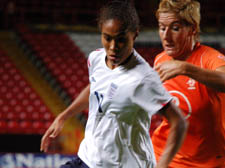|
|
 |
| |
Women stay true to the ideals of the beautiful game
As big money and corruption spoil what was the people’s sport, Catherine Etoe focuses on an England football team thatis an inspiration
Three Lions On Her Shirt: The England Women’s Story.
By Catherine Etoe and Natalia Sollohub.
Tempus Publishing Ltd £14.99 Order this book
EVER dreamed you played for England? I have: about 600 times. Let me tell you, it was exhausting. Every morning I’d wake up in a cold sweat, usually because I’d just tripped England women’s winger Rachel Yankey with a clumsy tackle, or peevishly lobbed a water bottle at the bench after being substituted for Beth Ditto from the Gossip.
Sounds ridiculous, but I had good reason to obsess about playing with the best female footballers in the land – I was writing a book about them and for six months, I ate, slept and breathed England.
Three Lions on her Shirt: The England Women’s Story, written in collaboration with researcher, photographer and television highlights editor Natalia Sollohub, is our account of the national side’s battle to reach the Women’s World Cup in China this September.
The squad fly out to Asia this week so you can guess how the story ends.
But England’s bid to qualify for the most prestigious competition in the world is only a small part of Three Lions – the real meat of the story is provided by the footballers themselves.
Having covered the women’s game since the editor of this newspaper ordered me to turn sports bigmouth and write a barbed comment piece on Patrick Vieira’s spitfest with Neil Ruddock, I had an inkling they all had stories to tell.
More than 60 interviews, hours of painstaking research, hundreds of motorway miles and copious cups of tea later, we realised those tales were more inspirational than we had ever expected.
Here were women so eager to play they had pretended to be boys, shrugged off pitch-side abuse, overcome horrendous injuries and juggled gruelling training regimes with exams, work and even motherhood.
Take England manager and former international midfielder Hope Powell, who fell foul of her worried mum after her first training session as an 11-year-old Millwall Lioness.
“They asked me to come back, but I got home very late that night and my mum said, ‘You are not going again’,” she told us. “Come Sunday I went, said I’d gone to the chip shop or something. I was that girl in Bend It Like Beckham, in part.”
Or BBC pundit and England winger Sue Smith, whose mum has kept newspaper cuttings from the year mixed-age rules meant she was kicked out of her boys team aged just 10.
“It is ironic that when we have training all the boys want her to be on their side because she is that good,” her coach told the press at the time.
“The rules say that she can’t play and so that is it. But at our presentation evening we awarded Sue a special trophy for her outstanding performances last season.”
Then there was defender Mary Phillip, who had to plonk her squawking baby in the arms of her team manager during one crucial away match.
And star player Kelly Smith’s parents, who were speechless with emotion the day their daughter left for America in search of a career as a footballer that was unavailable at home.
In short, they were tales of success against the odds from players who put as much effort as their male counterparts into representing their country, but who do so without the fame, wealth or recognition enjoyed by Steve McClaren’s band of millionaires.
Would they have invited us into their homes and workplaces, introduced us to their folks, made us cups of tea and told their stories without forcing us to jump through agents’ hoops and reveal the bottom line first?
Probably not, because men’s football exists in a world where a day at the football can cost as much as a week’s shopping – you can get a hip replacement on the NHS faster than you can qualify for a season ticket and players barely acknowledge the fans as they dash off down the tunnel and into their four-wheel drives.
Take your kids to watch a women’s game and sure, they’ll get a game that is slower than the men’s, but they’ll also witness skill, and have a chance to talk to the players and connect with the sport.
It is something former Hampstead School pupil and England player Rachel Yankey can testify to after driving her own soccer school pupils to a crucial Arsenal tie.
“We’re in the Uefa Cup semi-final and I'm driving a mini-bus full of kids to the ground,” she told us.
“But when you see them back in school, telling their mates, it was like it didn’t matter that it was women’s football
or men’s football, it was just that they went to the game and felt proud.
“It was something that was theirs.”
Does that remind you of anything?
That’s right, football the way it used to be.
Maybe if the women’s game can carve out that niche for itself, it might just be on to a winner.
|
| |
|
 |
|
| |
 |
|
 |
|



